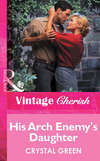Czytaj książkę: «Courted by the Texas Millionaire»

Just the brush of skin against skin was enough to turn his belly upside down, his chest inside out.
Davis looked down at Violet, her cinnamon-brown eyes soft with an openness he hadn’t seen since she’d returned. Questions, answers.
Could it work if we tried again?
Yes, he thought, in this moment. Yes, it could.
He could hear her breathing, and each inhalation swept through him, too. It seemed right to go a little further—to wind his finger around hers under the cover of all those ribbons, to link to her in such a small yet significant way.
Around them, it was as if everything and everyone had stopped motion, frozen in time while Violet and Davis caught up with each other in the Texas heat.
Kiss her. God, he wanted to kiss her so badly …
Dear Reader,
Welcome to my new miniseries—St. Valentine, Texas!
It’s so exciting to settle in to a fresh town, especially one that has a deeply buried secret that’s about to unravel, thanks to a stranger who sets off a series of events that start in this book.
The two people who go about investigating this secret are our hero and heroine, but digging up the town’s past isn’t all they’re doing—there’s love in the air for them, in spite of a painful, shared past of their own. But this Romeo and Juliet are going to find a happy ending, no matter what obstacles befall them!
Thanks so much for reading my books! In appreciation, I always have a contest running at my website, www.crystal-green.com. You can also check my blog and Twitter (I’m @CrystalGreenMe) for updates about my upcoming projects!
All the best,
Crystal Green
About the Author
CRYSTAL GREEN lives near Las Vegas, where she writes for the Cherish and Blaze® lines. She loves to read, overanalyze movies and TV programs, practice yoga and travel when she can. You can read more about her at www.crystal-green.com, where she has a blog and contests. Also, you can follow her on Facebook at www.facebook.com/people/Chris-Marie-Green/1051327765 and Twitter at www.twitter.com/ChrisMarieGreen.
Courted by
the Texas
Millionaire
Crystal Green

To all you readers who have allowed me to write for
you. It’s been over ten years now (!), and I hope the
dreams you find in these books are just as
beautiful as the ones you have in life.
Chapter One
Violet Osborne was back.
Davis Jackson watched her slow down as she walked by his newspaper office and peer through the glass window. He lowered his flute of champagne while, around him, the fundraiser he was hosting for the town’s Helping Hand Foundation sparkled with activity, much like the Cristal bubbles in the drink he’d served to his guests.
Violet.
The girl who’d gotten away.
She stopped at his door. His heart thudded, as if it was running backward, fifteen years to the past, to the day she’d left him for college, abandoning little St. Valentine, Texas, in her rearview mirror. Abandoning him.
Their gazes locked as they stood there, and he knew she could feel everything he felt—the sharp edges of all the questions left unanswered between them, the tension of seeing each other again, all grown up, years later, man and woman.
Although Violet smiled at him, there were shadows in her brown eyes as she said hello by pressing her fingers to the glass that separated them.
Something clenched in Davis’s chest, and he forgot that he was in a crowded room, full of the town’s upper crust dressed in their cocktail-hour best.
Violet. Here.
The mayor’s voice brought Davis back. “Dessert’s ready!”
Davis heard everyone migrate toward the back of the high-tech office, toward where they’d pitched white tents outside to accommodate the food. Violet still waited, as if she didn’t know whether to come inside or just walk away from Davis. Again.
The memory of that day, the slam of realizing that he didn’t mean all that much to Violet, the miner’s daughter he’d fallen for, the off-limits girl who’d seemed to know him better than anyone, tore into Davis like a fresh wound. But what pained the most was what she’d said that day, just before she’d left for college.
“Is it true? Are there other girls, Davis?”
Even though she’d said that she hadn’t believed it when she’d heard it, he’d seen a different story in her eyes—a doubt that he hadn’t changed enough to truly love her.
And that doubt had crushed the life out of what they’d had together in one swift moment, even if they’d naively thought nothing could tear them apart….
He opened the door, and Violet took a breath, as if she was readying herself for a reunion, not only with him, but with all the people who were filtering out of the back exit, checking her out and dismissing her because she was hardly important to them.
But Violet wouldn’t have been expecting any fuss from the others—not after she’d spent her time in St. Valentine making it plain that she wanted to leave. The attitude hadn’t gone over well with the townies or most of the miners.
Yet she’d made good on all her youthful confidence, hadn’t she?
Her sophisticated hairstyle made her straight, dark red hair brush her neck. It went well with those big brown eyes that told you there was a quick mind always at work. Womanly curves, too, enhanced by a fashionable yet professional yellow summer blouse and white pants that hugged shapely hips and long legs …
Yeah, all grown up now.
“Violet,” he said, and it sounded as if he’d been nursing her name inside him for years, even if he’d just realized it now. Immediately, he wished it’d come out differently: as if he’d spent all these years never thinking about her.
She had seemed to be deciding whether to hug him or not, but his own posture—stiff-shouldered, his body just now catching up with his bruised pride—must’ve warned her off, because she didn’t make a move toward him.
“Davis,” she said in a low tone that had always belied a prim, innocent facade. He’d always thought that Violet sounded like a Hollywood actress who hadn’t found the limelight yet.
But from what he knew about the career she’d built on the city desk of the L.A. Times, she’d become a rising star in the world of journalism.
She stuffed her hands in her pockets, acknowledging the tension between them. “I was just walking around Old Town, taking everything in.”
She glanced around the now-empty room. The silence of it echoed.
As if wanting to fill it up, she asked, “What’s the occasion?”
Dancing around the past like this shouldn’t bother him as much as it did. Years had gone by. He could be civil, even though he felt the anger, the shame of her leaving him creeping back up on him. “It’s a fundraiser for a local charity. We had the reception in the Recorder’s office because the paper’s been featuring different families who need some extra help these days.”
She’d grown up with a lot of the hard-luck families who benefited from Helping Hand, some of them mining people who’d been struggling ever since the kaolin operation had shut down. That mine had once been the foundation of St. Valentine, producing china clay that could be used to make paper, plastic, paints and the like.
He put his champagne down on a desk. Friendly. He had to be friendly, because time had passed and he’d matured. None of it mattered now.
“So you’re paying the town a visit,” he said.
“I guess you could call it that.” Her skin flushed as she glanced away. “It won’t be for very long, though. I can’t even stay here right now—I’m starting a shift at the Queen of Hearts.”
“Helping your parents for the weekend?” God, this small talk was killing him.
Violet wandered a few steps away, robbing him of the high he felt just standing close to her. “You’re going to hear this sooner or later,” she said, “so I’ll just tell you. I’m here temporarily because I lost my job at the Times. Layoffs. The economy. You know.”
“I’m sorry to hear that.”
He’d spent a lot of time that long-ago summer thinking bitter thoughts about her, as well as about his mother, who’d been the driving force in making Violet leave. Mom had found out that the rich kid and the miner’s daughter were having a secret relationship.
Sure, he’d been the one who’d suggested keeping the meetings under the radar, “just for the summer,” until college started and they could leave for L.A. together to start a new life. But, really, he had wanted secrecy because he’d been just as bad as his mom when it came to being fully aware that Violet was a miner’s girl.
He bit back the memory, but echoes of the past gnawed at him.
You can do better than one of them, his mom had always said, urging him to date the cheerleaders and socialites he usually saw—all the girls who didn’t do much for him except allow him to steal kisses and more.
None of them had held a candle to Violet, who was watching him now, running a slow gaze down him—from his Prada suit to the tips of his polished Justins.
His entire body beat right along with his pulse.
“Look at you. Look at all this.” She laughed quietly, glancing around the small front office, with its army of computers warring with old-time pictures of the first buildings, dusty streets from the late 1920s, antique Fords and burros. The town founder, Tony Amati, sitting on the front porch of the lone hotel in what was now called Old Town, smoking a cigar down to ash.
“What’s so surprising?” he asked.
“Everything. I never thought that you would take over the Recorder. I mean, you were in journalism class because it was the only elective open on the schedule senior year.”
“I only wanted enough academic credits to graduate.”
“But you got good at reporting, Davis.”
He fought the urge to close his eyes, to let himself be that high school kid who would’ve allowed the sound of her speaking his name wash through him.
But he’d learned to keep his eyes wide open. Senior year, when he’d joined Violet’s paper—she’d been the territorial editor—he’d only meant to slide through just another class with some smooth talk to the teacher and a minimum amount of work. But he’d found out that he was pretty good at investigating—and he’d found Violet, too.
They’d butted heads over everything—the opinionated kid from the east side of town versus the feisty girl from the west side. But he hadn’t argued with her just because of his stances on the issues—he’d enjoyed seeing the fire in her eyes. It had made him feel more alive than he had ever felt before with anyone.
Then, one night, they’d stayed late, getting an edition of the Rebel Rouser to press.
And it’d happened.
Davis hadn’t planned to kiss her. But she’d been so close to him, smelling like cherries, the warmth from her bare arms heating his skin, and he’d leaned over, feeling the hitch of her breath below his lips just before he’d pressed his mouth to hers.
Something had exploded between them that night, and up until graduation, they had met without anyone knowing about their relationship.
No one knew that they’d fallen in love.
At least, he’d thought no one had known—until his mother had confronted Violet.
He watched Violet walk toward that framed photo of Tony Amati on the wall.
“I thought for sure,” she said, “that you were going to take over that mine one day.”
She didn’t mention it with the spite other people used in St. Valentine—the accusation reminding him of what part he’d had in the mine’s shutdown. No, Davis noticed an appreciation in her expression.
Something wistful.
“Dad said you restored and reclaimed it,” she added.
“That was the least I could do for the town …” He didn’t finish, but it hung there in the air.
After I brought down the mine and the economy with a few newspaper stories.
He sat on the corner of his desk, watching Violet as she ran a hand over an antique Remington typewriter he’d bought on a whim, just because he could afford to.
Funny, how he was dying to let her know that he had enough to make a thousand men happy, thanks to the trust fund he’d padded with sound investments. Funny, how he wanted her to see that he’d done just fine without her after she’d left him that summer.
But that was the past speaking. Couldn’t he let bygones be bygones? The damage hadn’t lasted for very long. He’d forgotten her with other girls. Other women.
“Staying long?” he asked.
“Just enough time to beef up my bank account.” She shrugged. “And here I thought I’d have a Pulitzer by the time I was thirty-three.”
She blew out a breath, as if thinking of the dream job she’d had. Maybe she’d even lived in a condo like the sleek chrome and high-windowed place he’d had in Chicago, during his first real-life job. He’d traveled across the U.S. for a while after graduating, just to get away from his mom. Then, at the urging of Wiley Scott, who had owned the town paper, he’d gotten into Northwestern. Soon after college, he’d landed the St. Valentine kaolin mine story and returned home permanently to make up for the devastation. And he’d been doing that ever since, as if he had something to prove to the town.
Or maybe to a girl who’d seemed to believe, even for a moment, that Davis Jackson could never be more than a rich, careless playboy.
He crossed his arms over his chest. “The newspaper industry is a mess right now, so you can’t take being laid off personally.”
“Right,” she said, obviously putting on a happy face for both of their benefits. “I know you’re right.”
When she looked at him again, she’d somehow managed to retrieve that confidence that had always defined Violet Osborne, a girl whose dreams had been too big for a town like St. Valentine. And to have to come back to a place she’d worked so hard to get out of …?
From the rear of the office, Davis heard the door opening, letting in the sound of laughter from the guests he was supposed to be hosting. Then it closed.
Violet heard it, too. “I should let you go.”
But he didn’t want that. Dammit, just seeing her again …
It brought back so much. It made him want to know if she saw the changes in him.
She offered one last, tentative smile, then moved toward the door. The sway of her hips under her pants caught Davis’s eye before he forced his gaze away.
She spoke over her shoulder, hand on the doorknob. “I just wanted to congratulate you—all the things you’re doing and have done for St. Valentine. All the things you’ve accomplished. Even my dad’s been saying good things about that.”
“Your dad complimented me?”
“I wouldn’t call it complimenting, exactly. More like he was sticking up for you. He got into it with a few ex-miners once, and he pointed out that you didn’t bring on that safety investigation—it was him and a few others who opened their mouths when your mother ignored their concerns after the accident.”
Davis only wished that everyone in town felt the way her dad had, even if he knew the man had never liked him much, with Davis being the privileged Jackson whose family owned the mine.
And when his exposé forced a closure … Well, that left every miner but the whistleblowing ones against him. Especially the younger guys who’d been hired away by his mother to work the family’s natural gas operation near Houston. It was as if they didn’t realize that Davis’s mom had primarily hired them on merely as an apology for what had gone down at the mine.
How anyone could’ve forgiven her was a mystery to Davis. After all, back when his father had owned the mine, safety had been the highest concern. His mom hadn’t agreed. After his death, she’d become a big fan of money—or what she saw as security—first and foremost.
Back then, Davis had just purchased the Recorder, and he’d published articles about the mine based on his interviews with the whistleblowers, even though that hadn’t kept one worker from nearly dying after he’d been buried in a trench while installing a drainpipe.
Then Davis had stepped up his investigation, and many folks had blamed him for the Mine Safety and Health Administration coming in. The federal organization cited inadequate procedures throughout the mine, and his mom had decided to shut down under the pressure, offering natural gas jobs out by Houston instead.
After that, the west side of St. Valentine had felt like a ghost town. And, to Davis, it’d felt doubly so with his mom. She’d accused him of writing that exposé because of a rebelliousness that had started when he’d blamed her for getting Violet to leave.
Maybe he had been driven by a need to show his mom that she couldn’t control him, as well as a true sense of doing right for the town he’d loved enough to come back to in the end.
Violet dared to wander nearer to him, to lay a hand on his arm. The heat of her touch seared his skin.
Did she feel it?
He pulled away, cursing himself for caring.
She didn’t move, and for an instant, he thought this might be the prelude to them finally saying something meaningful.
But he could see the thoughts turning in her mind. She already had everything planned out: get back on her feet with the waitressing gig, leave the town that had always looked down on her for being uppity the minute she could afford to.
The back door opened again, footsteps on the wooden planked floor …
Davis stood from the desk as Mayor Neeson and his daughter, Jennifer—a dark-haired flirt in a red dress who grinned at Davis—came into the room. She was delicately holding the stem of a champagne glass in one hand while eyeing Violet, who eyed her right back.
“Coming out for dessert anytime soon?” the mayor asked Davis, ignoring Violet altogether.
His hackles rose, just as they’d always done when he’d seen the rich kids at school dismiss Violet and her ambitions so carelessly.
Why now, though?
“Ray,” Davis said, “you remember Violet Osborne?”
The mayor merely nodded to her. Jennifer instead focused on Davis as if Violet didn’t even exist.
He’d had a few good times with Jennifer, and that must’ve given her the idea that he would be on her side. But he wouldn’t let himself be that petty.
When Jennifer saw that she was alone in this, she shot a bored glance to Violet. “This is the last place I ever expected to see you again.”
Violet didn’t say a word. Instead, her shoulders stiffened.
“What brought you back?” Jennifer asked. “Did the bright, shiny world eat you up then spit you back out here?”
Davis was too busy feeling the punch of those words to notice Violet’s immediate reaction.
“Jennifer…,” he said.
He heard Violet mutter an “It was good to see you, Davis,” just before she turned and walked out of his office, dignified, seemingly in no hurry, although he could bet she only wanted to run.
Violet felt as if she were burning up under the waning July sun as she walked as quickly as she could down the wood-planked sidewalk of Amati Street.
Mortified. Leave it to Jennifer Neeson to be the first to take a shot at her. If there was a better example of how a miner’s kid with ambition didn’t have a chance at breaching this town’s social divides, Violet would be hard-pressed to find one.
She knew that she deserved some comeuppance for her attitude back before she’d left town. She’d been prepared for it. That didn’t mean it stung any less, though.
The dusky, heavy warmth of the afternoon took her over as she continued walking. But the prickly discomfort wasn’t only coming from the weather—it had a lot to do with seeing Davis again, too.
Her body swarmed with a need she hadn’t felt in such a long time—hot, rushed, breathless.
The boy who’d brought out the fun part of her … The guy who’d thought her ambitions were admirable … Davis had been everything to her at one time, and it had taken eons to push the hurt away.
Maybe it had never even left …
When she’d strolled by the newspaper office tonight, she hadn’t intended to go inside. She’d been going in that direction, anyway, and the curious part of her had only wanted a peek inside the Recorder. Little had she known that he would be standing right there, as if waiting for her the entire time.
And when she’d seen him …
It was as if every bone in her body had turned to liquid, flowing downward, inward, swirling with so many emotions that she hadn’t been able to identify them until now—disappointment at what had happened all those years ago. Surprise that Davis might just remember every bit of it. Exhilaration at seeing him again.
Back then, when Davis had first invaded her newspaper staff, she’d dismissed him. He’d worn expensive leather jackets, nice shirts—a wardrobe that probably cost what her father made in a week at the Jacksons’ mine.
But Davis had intrigued her, too. And, somehow, while they’d spent all those hours after school working on the paper, the sparring between them had turned into a few deep conversations. She’d seen beyond a rich boy into a guy who shared her intellectual curiosity about the world she longed to be a part of outside St. Valentine. She’d told him about her great-aunt Jeanne and all the stories she’d given to Violet while growing up—travels to Paris, London, cities that never slept and offered so much more opportunity than this speck of a town.
And then, when he’d first kissed her … their relationship had taken a serious turn. Until the day his mom had come to her and told her that Davis would never take any relationship seriously—especially not with a girl like Violet. That he was even seeing girls on the side right now and she shouldn’t bank her future on him.
But the man Violet had seen today seemed serious enough. His shoulders were wider, his chest broader, his legs even longer than she remembered. And there was something in his gaze that was harder than it’d been before.
She reminded herself that he’d let her go, just as much as she’d gone. He had told her that his mom was lying about the other girls and she’d genuinely believed him, but she’d already done the damage by even asking if the words were true. It had taken merely a split second to destroy what they’d found that summer—so quickly that she’d wondered for a long time just how real their love had even been, and if they’d been much too young to know what love was.
Had all those questions only been a way of distancing herself from the anguish, though?
Right now, as her chest constricted, she wasn’t sure.
The Queen of Hearts Saloon was up ahead, surrounded by the dirt road and weathered buildings. A few burros—descendants of the original silver-mining beasts of burden—lingered by the whitewashed church with its stained-glass windows. The folks up in Old Town had grown so used to them over the years that they took it upon themselves to feed them, and the tourists loved them.
She was just coming to the jewelry store when she heard hard boot steps on the boardwalk, felt a hand on her arm.
Her breath hammering from her lungs, she could only spin around and gape at Davis as he loomed over her—the jet-setting cowboy with the carefree dark blond hair and ice-blue eyes and fancy suit.
“What are you doing?” she asked, as he led her into a nearby alley, where no passersby could see them.
“I’m doing what I should’ve done the second you came into my office.”
Here it was—the moment she had known was coming. Why had she thought she could get away with seeing him again without any consequences? All she’d wanted to do was get the awkwardness over with, knowing she was bound to run into him sometime.
“I’m here,” he said, his hands planted on his hips, making him more imposing than she’d ever remembered, “to clear the air, because it sure didn’t happen back there in the office.”
She thought of how Mrs. Jackson, with her crisp red suit and her coiffed, bleached hair, had been waiting for Violet in the library parking lot that day, after one of her trysts with Davis in the woods out back, where it was private. They’d been so intent on keeping their relationship from their families in particular, because her dad, a miner, would’ve flipped, grumbling about selfish, greedy rich people and how Davis would only drop Violet when he was done with her. And Davis’s mom? She was as biased as they came against “the less fortunate.”
Sometimes Vi had even wondered if Davis himself liked to maintain their secret because he was afraid of public opinion, but then she’d tell herself she was crazy, that he was nothing like his mother.
Violet rested against the beaten wood wall, resigned. If he wanted to clear things up, they could do that. It was better than having to tiptoe around him for the next couple of months.
“If you want to rehash everything,” she said, “we can do that.”
“I never got a good answer about why you left.”
All right, then. “When your mom said that this ‘thing’ between you and me wasn’t going to last, she sounded so reasonable about it. She said that it’d be foolish to throw away my scholarship on a summer fling.” Violet took a second, waiting for her runaway heartbeat to catch up, then said, “And when she said you were seeing—”
“Other girls. You know that wasn’t true.” Davis said it with an edge that he tamped down by gritting his jaw, looking away, as if his old anger had been rekindled, undying.
She searched for words, finally finding them. “What do you want me to do now, Davis? What would make you feel better?”
His jaw tightened. “Nothing.”
His gaze was tortured, as if there were a thousand things he wanted to say but wouldn’t.
A vibration—a warmth that whirled and just about took her under—consumed her. She’d tried for so long to never be affected by what anyone in this town thought or said, but here she was, thwarted by that very thing—and it was from the man who’d affected her so acutely all those years ago.
She couldn’t let down her defenses in front of him, especially now, when she needed the protection from what everyone thought or said the most.
Besides, who were they to each other anymore? She knew that he’d moved on—she’d heard stories from her mom, gossip. She’d seen the way Jennifer Neeson had glanced at him, as if they knew quite a bit about each other. He obviously hadn’t shut himself away, heartbroken, because of her.
But he wanted to clear the air.
He exhaled roughly, then started to walk away, even though the air was still as thick as steam.
“You were just as confused as I was that day,” she said on a choked note, stopping him. “I saw it in you. You were hurt that I was questioning you, but all I needed to hear was that you hadn’t looked at another girl since we’d started seeing each other.”
“I thought you already knew that.”
She swallowed, her throat one big ache. “I was a kid, and your mom knew I’d be rattled by what she told me.”
“You should’ve known that you changed everything about me, Vi.”
When she glanced up, she saw more yearning in his eyes.
But then it disappeared.
He adjusted his burgundy silk tie, then started to leave again, as if they had finally knotted up their loose ends.
“I only wanted you to know that,” he said.
She could barely nod.
Then after a pause in which she thought he was going to tell her—what? What could he say now?—he moved out of the alley, turning the corner, out of sight.
But not out of her heart or mind.
Darmowy fragment się skończył.



















